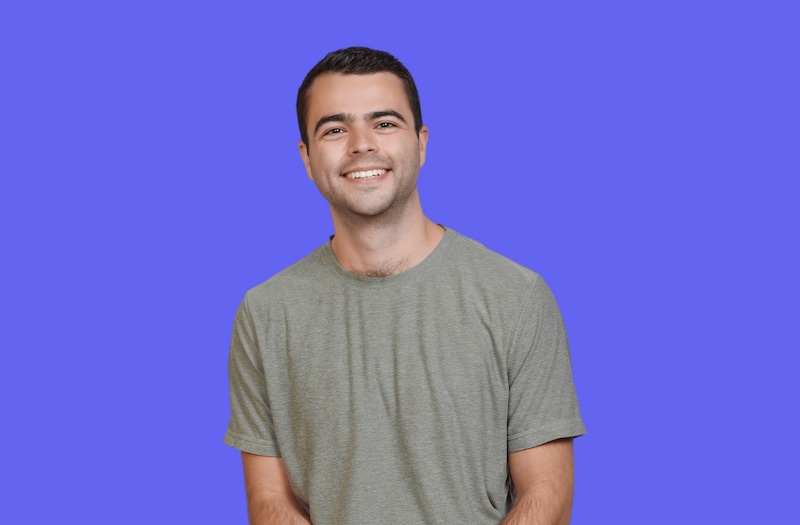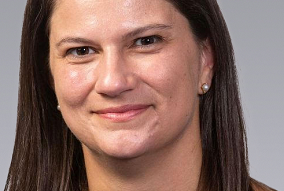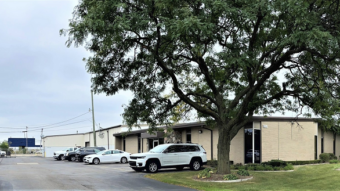At 25 years old, Tim Gamble has already surpassed the career aspirations of many. As Enodo‘s first employee, Gamble earned recognition as ChicagoIand’s 25 under 25, and after Enodo was acquired by Walker & Dunlop in 2019, he advanced from data engineer to vice president of data engineering—and is now focused on his own venture, HelloData.ai.
In a recent Q&A, Gamble discussed his career thus far and the role of artificial intelligence within commercial real estate.
Illinois Real Estate Journal: Tell us about your background. Where did you grow up? Where did you go to school?
Tim Gamble: I grew up in Park Ridge, Illinois, just outside of Chicago. Since I was little, I really enjoyed building things. I was also really curious about computers and how they worked. As I grew up, these two passions began to overlap and ultimately led me down the path of programming.
I went on to study computer science at DePaul University where I had the opportunity to join Enodo, a real estate predictive analytics startup, as its first employee and worked there through its acquisition by Walker & Dunlop. It was an amazing experience to work at a startup, and then a publicly traded company. These experiences fueled my desire to further explore the real estate AI space at HelloData.ai, a startup I co-founded.
Our goal with HelloData.ai is to help real estate companies leverage the power of AI and computer vision within their existing workflows. We build products that can easily be integrated with email, Excel, Salesforce, etc…everywhere real estate people work.
Illinois Real Estate Journal: What sparked your interest in real estate and AI technology?
Gamble: Let’s rewind to when I was introduced to Marc Rutzen, one of my now co-founders at HelloData.ai. In my very first class at DePaul University, a professor connected me with him regarding a data engineering internship opportunity.
My interest in real estate and AI was immediately sparked when I realized just how much data existed on each real estate property across the country. I’ll never forget wrapping up my first data pipeline project, which processed the data on hundreds of millions of properties. There was so much information being processed—and I knew that, at this scale, the only way to pull out insights would be with AI.
During the internship, I enjoyed building a predictive analytics platform for the real estate space. Our goal with that platform was to streamline the underwriting process for real estate. But over time and working with clients, we found that extracting information from documents was very useful, such as pulling rent and occupancy data from rent rolls, or extracting financials from operating statements. I became the first employee at Enodo, and that’s where I met Nicolas Lassaux.
After the company’s acquisition, we continued to build on the technology, ultimately developing software that processed tens of thousands of documents a year. We primarily focused on improving operational efficiencies, working closely with underwriters and producers.
It continues to amaze me how quickly the AI field is moving. It makes it all the more exciting to see how the latest and greatest in AI can be used to help real estate companies operate more efficiently.
Today, I enjoy developing products that use both artificial intelligence and computer vision. For example, we know a picture is worth a thousand words, and with our QualityScore.ai product, clients are able to extract amenities, room type, curb appeal and interior quality of real estate in seconds by analyzing property photos. So, analysts and investors are able to do what they do best—look at more properties that fit their investment criteria each day rather than spending hours manually entering data from one place to another. There are other uses for our QualityScore.ai product, too, from virtual inspections and appraisals all the way to incorporating the score into valuation models to better understand the value of certain properties, which was a hard thing to be able to capture from just static data that you can find on properties online.
Another trend in our tech is meeting people where they are. Instead of building another platform with another login, all of HelloData.ai’s products meet clients where they work, integrating with CRMs, email, and existing workflows, too.
Illinois Real Estate Journal: What does a day in the life look like?
Gamble: Fellow co-founder Nico is based in Amsterdam, so with the time zone difference, we are very active first thing in the morning. A typical day starts with a morning meeting with Marc and Nico to discuss our goals and objectives for the day.
I’ll typically join a few business development calls with real estate companies and check in with our pilot program clients. We talk with these groups to validate assumptions as well as build new relationships that can hopefully evolve into them being customers.
Besides these calls, you will find me mostly working on furthering the functionality of our algorithms. We have a long-running list of features that we would like to make to our existing product offering and knocking these out takes up a majority of my day.
Illinois Real Estate Journal: What do you consider to be your biggest personal or professional accomplishment thus far, and how do you measure success?
Gamble: While I’m 25, I’ve already been through a startup acquisition, worked at a VP level at a publicly traded company and am now a co-founder of a real estate artificial intelligence company that develops algorithms to extract structured data from real estate images and documents.
Reflecting on these successes, I would consider my biggest personal and professional accomplishment to be juggling a full-time college course load while also working about 25 hours a week at Enodo. I did this for three years—graduating a year early—and it taught me a lot about how to manage my day. For example, I would schedule my course load so I could have three full days a week to dedicate at Enodo. I learned a lot during that time, and it is what ultimately set me up for success.
I measure success as a function of how much I learned throughout an experience. Working at Enodo and Walker & Dunlop was a very successful period for me because I was learning about business, real estate, data, artificial intelligence and so much more. Daily learning has continued with HelloData.ai, and I plan to make sure it stays that way well into the future.
Illinois Real Estate Journal: How do you see commercial real estate evolving in the next 5–10 years, and how do you anticipate HelloData.ai, or AI in general, playing a role in that evolution?
Gamble: Now that the appetite for AI has become much larger thanks primarily to ChatGPT, I believe AI will become the focus of most real estate companies over the next 5-10 years. Ten years from now, I would say all real estate companies will have AI incorporated into their workflows in some capacity.
To give a few ideas on where I think AI might pop up:
- Assisting in finding the best deals in target markets so the company can target their efforts on deals they are likely to win;
- Extracting valuable information from due diligence documents to help catch issues before they become a problem;
- All of the data that was previously locked in PDFs will be extracted and stored in databases ready to provide insights previously impossible to accomplish, something HelloData.ai is working on right now;
- Improving comparable property analysis, using more than just year built, number units, EGI, and distance. With the work HelloData.ai has been doing with image extraction and QualityScore.ai, companies can start using interior images to detect comparable properties. Similar properties may start being suggested in different states if the algorithm is able to perfectly understand the market conditions of both areas.
These are just a few areas where I see AI assisting the real estate industry, and HelloData.ai is positioning itself as the company that is taking these new technologies and finding ways to incorporate them into real estate companies.
I think about how the residential real estate space is moving faster in these areas and as technology becomes more of a competitive advantage, it won’t be unthinkable for commercial real estate professionals to underwrite deals in minutes. I imagine 10 years from now it will be commonplace to enter all of your deal terms and upload all of your due diligence documents for AI systems to double-check, streamlining the process of getting financing very quickly.
Illinois Real Estate Journal: What resources do you rely on to stay informed and up to date with the latest developments in both real estate and AI technology?
Gamble: I stay up to date primarily through the use of online communities and watching creators on YouTube. There are a number of industry-specific subreddits with active communities posting relevant information every day. I typically scroll through these daily and see if anything jumps out at me. I’ve also watched a lot of programming-specific YouTube videos over the years, so YouTube has started to suggest similar videos. It’s been interesting to see what is suggested since these are typically trending topics around software engineering.
Illinois Real Estate Journal: What advice would you give to aspiring entrepreneurs who are interested in starting a similar venture, based on your own experiences?
Gamble: My advice would be to get started now and keep it simple. If you solve a simple problem well enough, people will want to work with you to make it better. If people are willing to help in its early stages, you know you are onto something and can continue to build solutions that will solve the entire problem.
Then, reach out to people on LinkedIn that you think would find value in the product you are building and set up calls with them. You would be surprised by how many people are willing to talk—just ask them. Ask them to make introductions and use what you learn in each call to build on your expertise. After a few rounds of this, you will have a great group of people to bounce ideas off of. These will be your early adopters, and they will help guide the direction of your product.
Don’t be afraid to pivot your original idea. It’s possible your initial hypothesis was enough to have conversations with these people, but maybe it doesn’t solve their biggest problem. Focus on the area where you can provide the most value.
Illinois Real Estate Journal: How do you spend your time away from the office, and how do you balance the demands of running a company with these other aspects of your life?
Gamble: My time away from the office is typically spent hanging out with family and friends, exercising or doing something related to the outdoors. I really enjoy setting up camp somewhere and sitting around a campfire. There is something about being in nature that helps me unwind and separate myself from any stress.
I need to be very intentional about maintaining a balance because it is very easy to let the demands of running a company take over and leave you working all the time. I could probably work more hours, but I choose not to because I want to make sure that the expectations I set for myself are expectations I can sustain indefinitely. The last thing I want to happen is for this journey to end in burnout.




